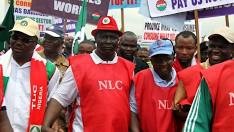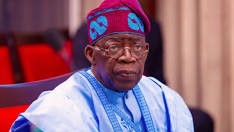After the walkout by the organized labor, which includes the Nigeria Labour Congress (NLC) and the Trade Union Congress (TUC), from the recent meeting with the Tripartite Committee on Minimum Wage, our correspondent has learned that the government has increased its proposed minimum wage from ₦48,000 to ₦54,000. This information comes from a highly reliable source present at the ongoing meeting in Abuja.
Organized labor strongly opposed the notion of a ₦100,000 minimum salary last week and urged the government to take the pay negotiations more seriously. They made it clear that the lowest reasonable minimum pay for workers served as the foundation for their ₦615,000 demand.
Joe Ajaero, National President of the Nigeria Labour Congress (NLC), has steadfastly supported the call for a minimum wage of ₦615,000. He clarified that this amount was established following a careful examination of the current economic climate and the necessities for a typical Nigerian household consisting of six members.
Ajaero attributed the collapse of the wage negotiations to the actions of the government and the organized private sector (OPS). He stated, “Despite our sincere efforts to reach a fair agreement, the unreasonable stance of the Government and the OPS has led to a breakdown in negotiations.”
However, the Director-General of the Nigeria Employers Consultative Association (NECA), Mr. Adewale-Smatt Oyerinde, criticized the unions for walking out before negotiations had properly commenced. He described this action as unfortunate and urged union leaders to reconsider their position. “For the sake of their members and national development, it’s crucial that the unions return to the negotiation table,” Oyerinde stated.

Ajaero, however, defended the decision to walk out, arguing that the government’s proposal of ₦48,000 as the minimum wage was unacceptable. “The government’s paltry offer of ₦48,000 not only insults the sensibilities of Nigerian workers but also fails to meet our basic needs and aspirations,” he asserted. He emphasized that the ₦615,000 demand is based on a realistic assessment of what is necessary to support a typical Nigerian family, highlighting the stark disparity between the union’s expectations and the government’s proposal.
The ongoing disagreement underscores the significant gap between the government’s and labor unions’ positions, with each side calling for a resolution that aligns with their respective assessments of economic realities and fair compensation for workers. As negotiations stall, the pressure mounts on both sides to find a mutually agreeable solution that addresses the needs of Nigerian workers while considering the broader economic implications.
“Though it is worth noting that even the least paid workers in the private sector receive ₦78,000, as clearly stated by the OPS, highlighting the stark disparity between the proposed minimum wage and prevailing standards, further demonstrating the unwillingness of employers and government to faithfully negotiate a fair national minimum wage for workers in Nigeria.”
He accused the government of failing to provide data to support its offer, noting that this undermined the credibility of the negotiations.
“Furthermore, the government’s failure to provide any substantiated data to support their offer exacerbates the situation. This lack of transparency and good faith undermines the credibility of the negotiation process and erodes trust between the parties involved.”
The NLC president emphasized the unions’ unchanging commitment to advocating for the rights and interests of Nigerian workers. He urged the government to reassess its stance and engage in negotiations sincerely, reflecting the true value of workers’ contributions to the nation and addressing the socio-economic challenges faced by all Nigerians due to federal policies.
“We need an agreement that truly acknowledges the significant role of Nigerian workers in national development and addresses the survival crisis caused by current government policies,” the labor movement declared.

On January 30, 2024, President Tinubu, represented by Vice President Kashim Shettima, inaugurated a 37-member Tripartite Committee on Minimum Wage. This committee, which includes representatives from the federal and state governments, the private sector, and organized labor, is tasked with proposing a new minimum wage before the current ₦30,000 wage expires on April 18. During the inauguration, Shettima urged the committee to reach a swift resolution and submit their recommendations promptly.
“This timely submission is crucial to ensure the emergence of a new minimum wage,” Shettima said.
As part of its ongoing efforts, the Tripartite Committee on Minimum Wage conducted zonal public hearings on March 7 in various locations, including Lagos, Kano, Enugu, Akwa Ibom, Adamawa, and Abuja. During these hearings, the Nigeria Labour Congress (NLC) and the Trade Union Congress (TUC) presented different wage proposals in response to the prevailing economic hardships and the high cost of living.
In the South-West states, NLC members proposed a minimum wage of ₦794,000, while the TUC suggested ₦447,000. At the North-Central zonal hearing in Abuja, workers demanded a new national minimum wage of ₦709,000. In the South-South region, the proposed figure was ₦850,000. Meanwhile, stakeholders in the North-West suggested ₦485,000, and those in the South-East demanded ₦540,000.
Despite these varying figures, organized labor ultimately agreed on ₦615,000 as a realistic living wage. This figure represents a unified stance amidst the diverse regional demands, reflecting a consensus on what is deemed necessary to support Nigerian workers adequately in the face of current economic challenges.
The numerous minimum wage recommendations from various regions draw attention to the stark differences in income and the difficulties that Nigerian workers face. An urgently needed more balanced economic strategy is highlighted by organized labor’s united demand of ₦615,000 as a living wage, which demonstrates a deliberate effort to solve these challenges. The substantial variations in regional plans are a reflection of the disparities in living expenses across the nation, which call for a customized strategy for pay adjustments. Standardized minimum wages may not be adequate, and local economic circumstances should be taken into account by the government to provide equitable remuneration that genuinely satisfies the requirements of all workers.
Sources




